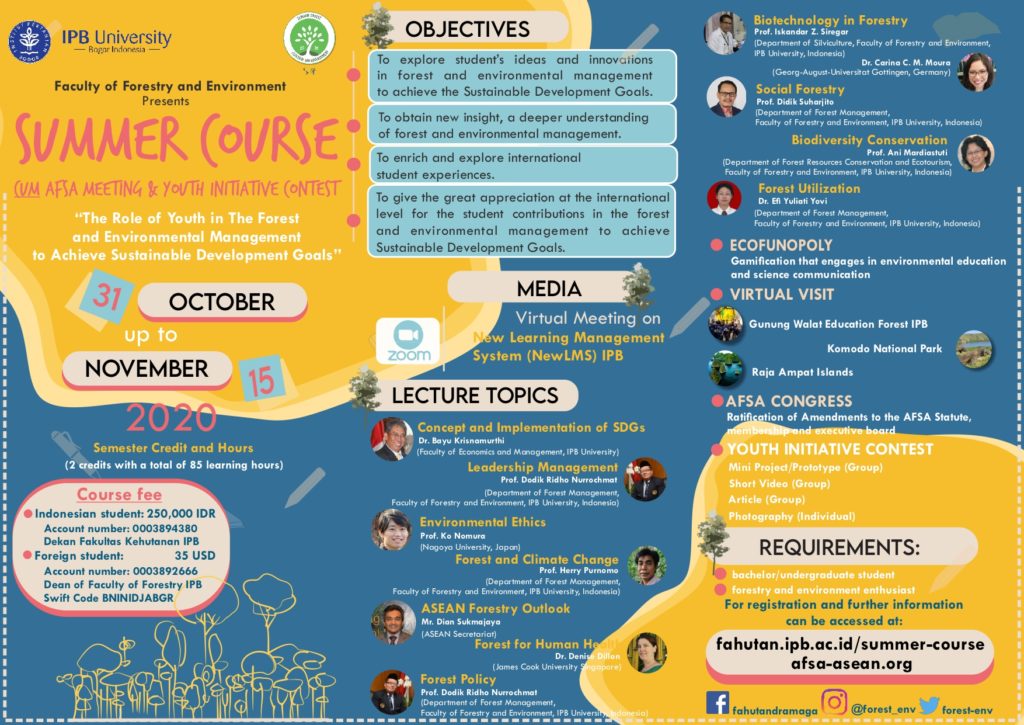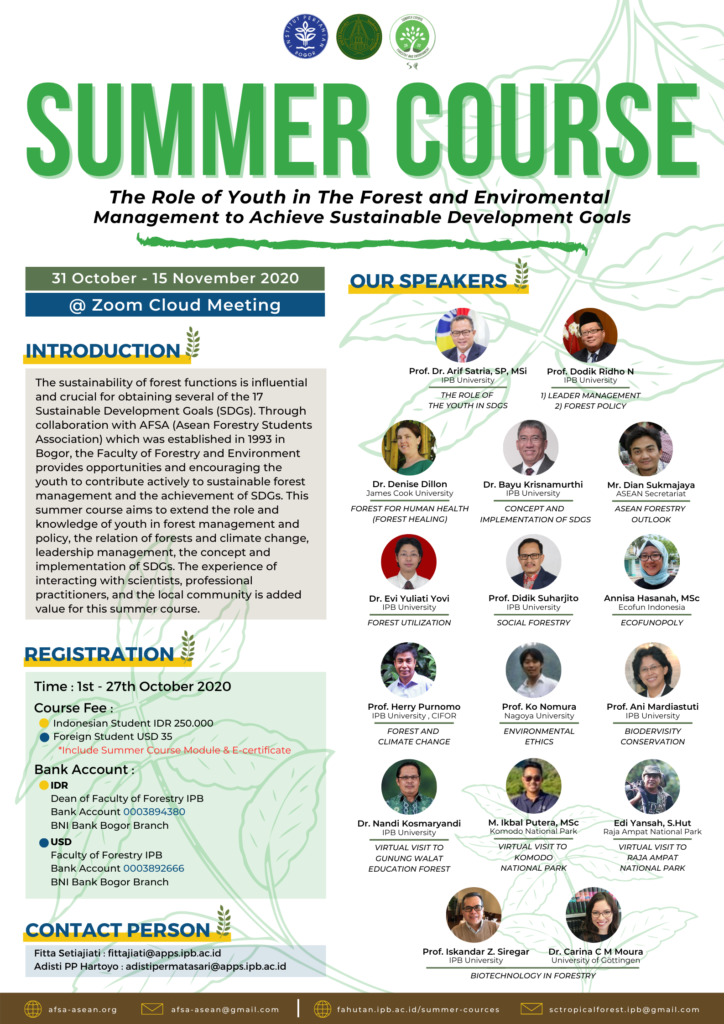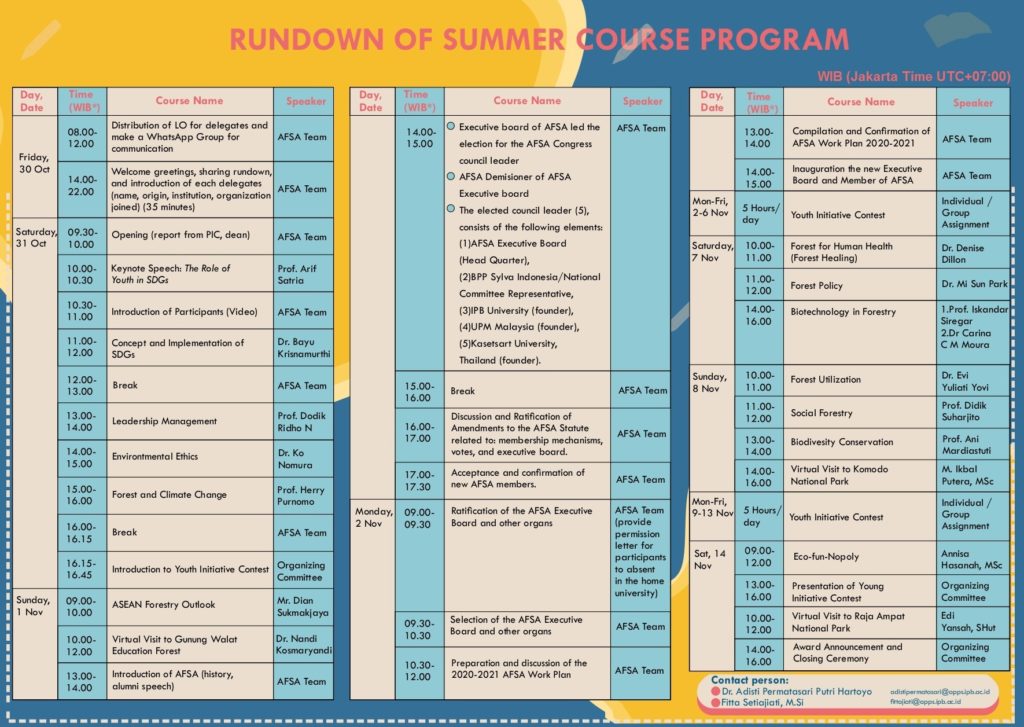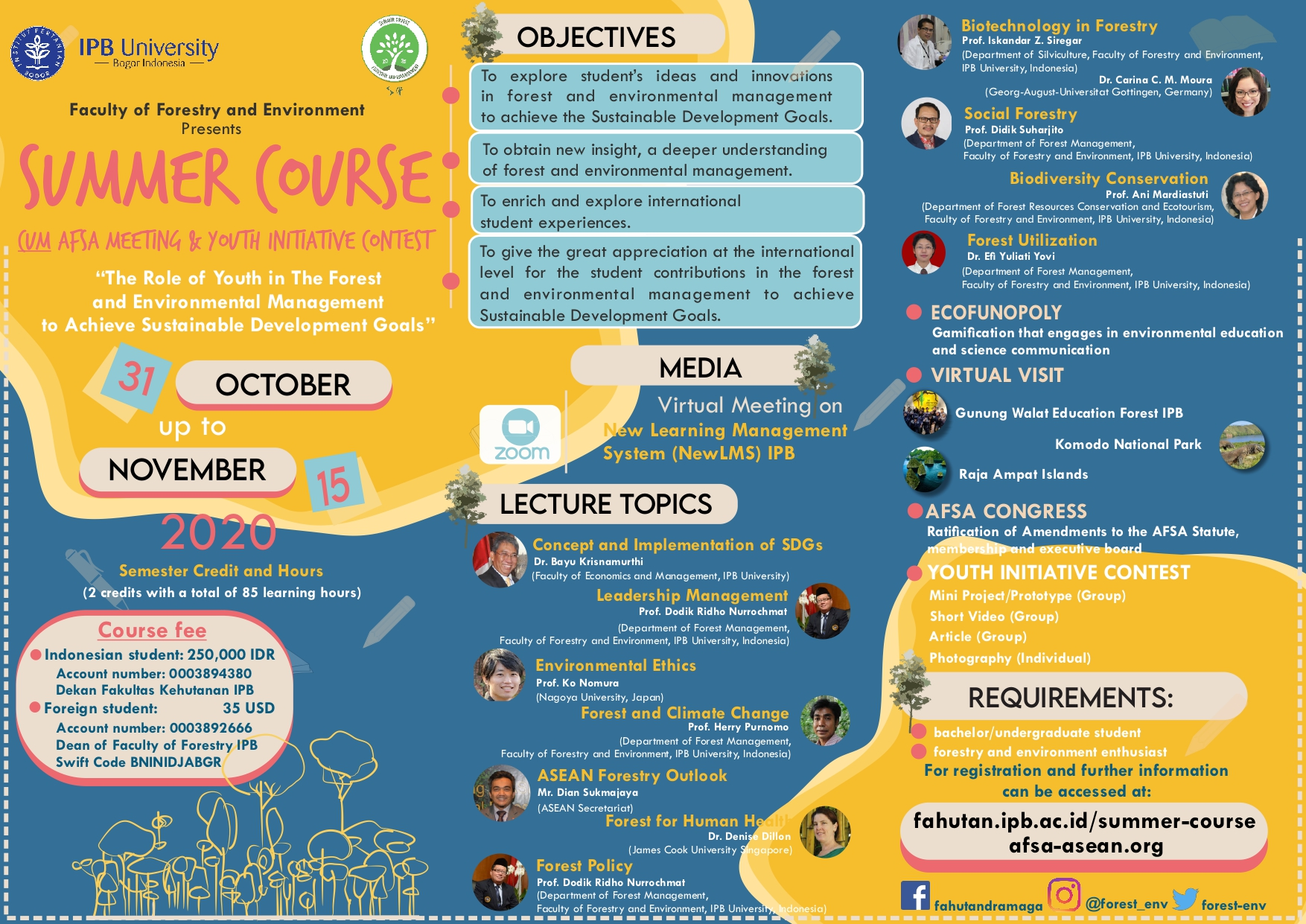SUMMER COURSE
The role of youth in the forest and environment management to achieve sustainable development goal
INTRODUCTION
- Background
Tropical forests are an essential natural resource that provide enormous tangible products (timber, fruit, resin, sap, etc.) and intangible products (biodiversity, climate regulation, CO2 pool, O2 producer, hydrology regulation, ecotourism, gene bank, etc.) which need to be managed wisely and appropriately so that the benefits can be utilized optimally for the stakeholders. However, the forest management system has historically tended to focus on timber utilization that unable to maintain the forest, especially for the natural forests as indicated by the decreasing number of natural forest concessions, low of natural forest timber production for the domestic industry, and increasing rates of deforestation and degradation. The excessive deforestation and degradation of Indonesian forests have resulted in increased CO2 emission and climate change, as well as the loss of biodiversity. Therefore, sustainable forest management should be carried out to reduce the impact of deforestation and forest degradation by considering social, economic, and forest ecosystem functions. Recently, forest management paradigm is changing from forest management with the aim of producing timber to forest management with the aim of preserving ecosystem services and forest ecosystem functions in achieving sustainable development.
Nowadays, the world is prosperous as a result of global economic growth. On the other hand, rapid deforestation, environmental and forest degradation, as well as climate change are being global issues. In addition, the results of economic growth are not widely distributed, where there are many gaps and unequal distribution of income between countries in the world. The concept of sustainable development which aims to end poverty, protect the environment, and improve the welfare of all mankind is urgently needed. Following up on this issue, the 2030 agenda for Sustainable Development Goals (SDGs) was created, consisting of 17 goals and 169 targets which were subsequently adopted by all United Nations Member States. Some of these goals are closely related to the forest and environment sectors such as Goal 13, which is to take urgent action to combat climate change and its impacts, and Goal 15, which is to protect, restore and promote sustainable use of terrestrial ecosystems, sustainably manage forest, combat desertification, and halt and reverse land degradation, and halt biodiversity loss (UNESCAP 2017).
Indonesia has a strong commitment to implementing the Sustainable Development Goals through the 2030 development agenda. In 2019, approximately 68.7% of the Indonesian population is dominated by the productive age group (15-64) (BPS 2018). This demographic percentage provides an advantage for the Indonesian economy because the young population is a high potential workforce that will be able to accelerate Indonesia’s economic growth. So, the young generation is an important actor in achieving the SDGs. They have a great capability to become agents of change for the people around them in this world. They also a leader of tomorrow and very essential to be informed, as well as engaged with the global agenda of SDGs. Hence, it is vital to increase the youth awareness regarding 17 SDGs and the 2030 Agenda for Sustainable Development such as by creating a forum for their discussion and active engagement through summer course program.
Summer course program “The Role of Youth in Forest and Environmental Management to Achieve Sustainable Development Goals” will be held by the Faculty of Forestry and Environment of IPB University in October 2020 and November 2020. The course is recognized to equivalent to 2 credits (semester credit hours) which contains 11 lecture topics and practices with a total of 85 learning hours. After joining this program, students are expected to be able to identify the issues in the forest and environmental management and be able to propose solutions to these issues. Besides that, students are expected to be able to have good teamwork, develop international networking, and communicate their ideas and innovations in relation to sustainable development goals (SDGs) to the stakeholders effectively.
1.2 Objectives
The objectives of this summer course program are:
- To explore students’ ideas and innovations in forest and environmental management to achieve the Sustainable Development Goals.
- To obtain new insight, a deeper understanding of forest and environmental management.
- To enrich and explore international student experiences.
- To give the great appreciation at the international level for the student contributions in the forest and environmental management to achieve Sustainable Development Goals.
- ACTIVITY DESCRIPTION
2.1 Media
Virtual Meeting by using ZOOM application and New Learning Management System (NewLMS) IPB.
2.2 Theme
The role of youth in the forest and environmental management to achieve Sustainable Development Goals.
2.3 Participants
The participants are targeted from various university in Indonesia (20 Universities that have Study Program of Forestry), and 14 abroad Universities from Southeast Asia, East Asia, and Europe. The total participants are approximately 60 students.
2.4 Schedule
Summer course will be held on 31 October 2020 – 15 November 2020 with detailed rundown presented in Table 1. The detailed of time allocation for each topic is presented in Table 2.
Table 1 Rundown of Summer Course Program
| Day,Date | Time (WIB*) | Time (Hour) | Course Name | Lecturer/Speaker |
|---|---|---|---|---|
| Friday, 30 Oct | 08.00 – 12.00 | Distribution of LO for delegates and make a WhatsApp Group for communication | AFSA Team | |
| 14.00 – 22.00 | Welcome greetings, sharing rundown, and introduction of each delegates (name, origin, institution, organization joined) | AFSA Team | ||
| Satur-day, 31 Oct | 09.30 – 10.00 | 0.5 | Opening (report from PIC, dean) | AFSA Team |
| 10.00 – 10.30 | 0.5 | Keynote Speech: The Role of Youth in SDGs | Prof. Arif Satria | |
| 10.30 – 11.00 | 0.5 | Introduction of Participants (video) | AFSA Team | |
| 11.00 – 12.00 | 1 | Concept and Implementation of SDGs | Dr. Bayu Krisnamurthi | |
| 12.00 – 13.00 | 1 | Break | AFSA Team | |
| 13.00 – 14.00 | 1 | Leadership Management | Prof. Dodik Ridho Nurrochmat | |
| 14.00 – 15.00 | 1 | Environmental Ethics | Dr. Ko Nomura | |
| 15.00 – 16.00 | 1 | Forest and Climate Change | Prof. Herry Purnomo | |
| 16.00 – 16.15 | Break | AFSA Team | ||
| 16.15 – 16.45 | Introduction to Youth Initiative Contest | Organizing Committee | ||
| Sunday, 1 Nov | 09.00 – 12.00 | 1 | ASEAN Forestry Outlook | Mr. Dian Sukmajaya |
| 2 | Virtual Visit to Gunung Walat Education Forest | Dr. Nandi Kosmaryandi | ||
| 13.00 – 14.00 | 1 | Introduction on AFSA (history, alumni speech) | AFSA Team | |
| 14.00 – 15.00 | 1 | * Executive board of AFSA led the election for the AFSA Congress council leader * AFSA Demisioner of AFSA Executive board * The elected council leader (5), consists of the following elements: (1) AFSA Executive Board (Head Quarter), (2) BPP Sylva Indonesia/National Committee Representative, (3) IPB University (founder), (4) UPM Malaysia (founder), (5) Kasetsart University, Thailand (founder). | AFSA Team | |
| 15.00 – 16.00 | Break | AFSA Team | ||
| 16.00 – 17.00 | 3 | Discussion and Ratification of Amendments to the AFSA Statute related to: membership mechanisms, votes, and executive board. | AFSA Team | |
| 17.00 – 17.30 | Acceptance and confirmation of new AFSA members. | AFSA Team | ||
| Monday, 2 Nov | 09.00 – 09.30 | 0.5 | Ratification of the AFSA Executive Board and other organs | AFSA Team (provide permission letter for participants to absent in the home university) |
| 09.30 – 10.30 | 1 | Selection of the AFSA Executive Board and other organs | AFSA Team | |
| 10.30 – 12.00 | 1.5 | Preparation and discussion of the 2020-2021 AFSA Work Plan | AFSA Team | |
| 13.00 – 14.00 | 1 | Compilation and Confirmation of AFSA Work Plan 2020-2021. | AFSA Team | |
| 14.00 – 15.00 | 1 | Inauguration the new Executive Board and Member of AFSA | AFSA Team | |
| Mon – Fri, 2 – 6 Nov | 5 hours/day | 25 | Youth Initiative Contest | Home Assignment (flexible hour)Home Assignment (flexible hour) |
| Saturday, 7 Nov | 10.00 – 12.00 | 1 | Forest for Human Health (Forest Healing) | Dr. Denise Dillon |
| 1 | Forest Policy | Prof. Dodik Ridho Nurrochmat | ||
| 14.00 – 16.00 | 2 | Biotechnology in Forestry | 1. Prof. Iskandar Z. Siregar 2. Dr Carina C M Moura | |
| Sunday, 8 Nov | 10.00 – 12.00 | 1 | Forest Utilization | Dr. Evi Yuliati Yovi |
| 1 | Social Forestry | Prof. Didik Suharjito | ||
| 13.00 – 16.00 | 1 | Biodiversity Conservation | Prof. Ani Mardiastuti | |
| 2 | Virtual Visit to Komodo National Park | Guide: M. Ikbal Putera, MSc | ||
| Mon-Fri, 9 – 13 Nov | 5 hours/day | 25 | Youth Initiative Contest | Home Assignment (flexible hour) |
| Saturday, 14 Nov | 09.00 – 12.00 | 3 | Eco-fun-nopoly | Annisa Hasanah, MSc |
| 13.00 – 16.00 | 3 | Presentation of Young Initiative Contest | Organizing Committee | |
| Sunday, 15 Nov | 10.00 – 12.00 | 2 | Virtual Visit to Raja Ampat Islands | Edi Yansah, S.Hut |
| 14.00 – 15.00 | 1 | Award Announcement and Closing Ceremony | Organizing Committee | |
| Total Time | 85 | |||
| Time | Topics |
|---|---|
| 12 | Concept and Implementation of SDGs |
| 9 | Leadership Management |
| 3 | Environment Ethics |
| 3 | Forest and Climate Change |
| 3 | ASEAN Forestry Outlook |
| 3 | Forest Utilization |
| 3 | Forest for Human Health (Forest Healing) |
| 3 | Biodiversity Conservation |
| 4 | Biotechnology in Forestry |
| 3 | Social Forestry |
| 3 | Forest Policy |
| 36 | Youth Initiative Contest on SDGs |
| Total of Time: 85 hours |
2.5 Course Description
The summer course program is divided into 5 main activities i.e. general lecture, game (ECOFUNNOPOLY), virtual visit, AFSA Event, and Youth Initiative Contest in which the expected learning outcomes after participants join in these activities are (i) participants will be able to explain the scope of SDGs and the role of youth in the implementing SDGs in their daily lives, (ii) participants will be able to explain the role of youth in the forest and environmental management practices in order to achieve SDGs, and (iii) participants will be able to describe the potential for ecotourism, culture, and biodiversity, as well as sustainable forest management and biodiversity conservation management practices applied in several national parks and education forest in Indonesia. The detailed of each activity described as follows:
2.5.1 General Lectures
The general lecture is divided into 11 topics with the details of each lecturer/speaker is presented in Table 3. Meanwhile, the details of each topic are described as follows:
- Concept and Implementation of SDGs
Course Description:
This course discusses the introduction of the SDGs; how the SDGs are relevant for the management of the global systems supporting humanity; what is the role of youth in the implementing the SDGs in their daily lives.
Learning Outcome:
Participants will be able to explain the scope of SDGs and the role of youth in the implementing SDGs in everyday life.
Lecturer:
Dr. Bayu Krisnamurthi (Faculty of Economics and Management, IPB University)
Date/Time:
31 October 2020, 11.00 – 12.00 WIB*
- Leadership Management
Course Description:
This course discusses the theoretical perspectives on organization, motivation, teamwork, ethics, and personal development; and focuses on developing organizational potential and skills, management skills, and leadership skills.
Learning Outcome:
Participants will be able to explain the leadership theories and be able to develop critical thinking skills, as well as use a process for decision making.
Lecturer:
Prof. Dodik Ridho Nurrochmat (Department of Forest management, Faculty of Forestry and Environment, IPB University, Indonesia).
Date/Time:
31 October 2020, 13.00 – 14.00 WIB
- Environmental Ethics
Course Description:
This course discusses the role of humans as environmental managers and their implications for human attitudes and behavior (ethics or morals) towards each other and towards nature as a whole; the role of youth on implementation of environmental ethics to support SDGs achievement.
Learning Outcome:
Participants will be able to explain the role of humans and their implications towards nature and explain the role of youth on implementation of environmental ethics to support SDGs achievement.
Lecturer:
Prof. Ko Nomura (Nagoya University, Japan).
Date/Time:
31 October 2020, 14.00 – 15.00 WIB
- Forest and Climate Change
Course Description:
This course discusses the role of forests in global climate change; the role of youth on climate change mitigation and adaptation in relation to SDGs achievement.
Learning Outcome:
Participants will be able to explain the role of forests in global climate change, the role of youth on climate change mitigation and adaptation in relation to SDGs achievement.
Lecturer:
Prof. Herry Purnomo (Department of Forest management, Faculty of Forestry and Environment, IPB University, Indonesia and CIFOR).
Date/Time:
31 October 2020, 15.00 – 16.00 WIB
- ASEAN Forestry Outlook
Course Description:
This course discusses current state of ASEAN forest and forestry; factors that influence the future state of forests and forestry; probable scenarios and their implications; and recommended strategic actions and policies that create a better future of ASEAN.
Learning Outcome:
Participants will be able to describe the current state of ASEAN forest and forestry.
Lecturer:
Mr. Dian Sukmajaya (ASEAN Secretariat)
Date/Time:
01 November 2020, 09.00 – 10.00 WIB
- Forest for Human Health (Forest Healing)
Course Description:
This course discusses the concepts and approaches of using the health benefits of forest and the integration of human health aspects into Sustainable forest management and SDGs achievement; the role of youth on utilization of forest for human health.
Learning Outcome:
Participants will be able to explain the concepts and approaches of using the health benefits of forest and the integration of human health aspects into Sustainable forest management in order to achieve SDGs.
Lecturer:
Dr. Denise Dillon (James Cook University Singapore)
Date/Time:
07 November 2020, 10.00 – 11.00 WIB
- Forest Policy
Course Description:
This course discusses the role of forest policy including international conventions and global problems in the forestry and environment to achieve SGDs; and the role of youth in forest policy processes in relation to SDGs achievement.
Learning Outcome:
Participants will be able to explain the role of forest policy to achieve SGDs.
Lecturer:
Prof. Dodik Ridho Nurrochmat (Department of Forest management, Faculty of Forestry and Environment, IPB University, Indonesia).
Date/Time:
07 November 2020, 11.00 – 12.00 WIB
- Biotechnology in Forestry
Course Description:
This course discusses the current development of forestry biotechnology; the role of biotechnology to achieve SDGs; and the role of youth on supporting forestry biotechnology development.
Learning Outcome:
Participants will be able to describe the role of biotechnology in forestry to achieve SDGs.
Lecturer:
- Iskandar Z. Siregar (Department of Silviculture, Faculty of Forestry and Environment, IPB University, Indonesia).
- Carina C M Moura (Georg-August-Universität Göttingen, Germany)
Date/Time:
07 November 2020, 14.00 – 16.00 WIB
- Forest Utilization
Course Description:
This course discusses the use of forests in a series of forest management activities; the role of forest utilization to achieve the SDGs; and the role of youth on forest utilization in relation to SDGs achievement.
Learning Outcome:
Participants will be able to identify the role of forest utilization to achieve the SDGs.
Lecturer:
Dr. Evi Yuliati Yovi (Department of Forest management, Faculty of Forest and Environment, IPB University, Indonesia).
Date/Time:
08 November 2020, 10.00 – 11.00 WIB
- Social Forestry
Course Description:
This course discusses various forms of human/community interaction with forests; policies and practices for developing community participation in the forest and environment management; the role of community/social forestry to achieve SDGs; the role of youth in supporting forest-dependent communities.
Learning Outcome:
Participants will be able to identify various forms of community interaction with the forest and its role to achieve SDGs.
Lecturer:
Prof. Didik Suharjito (Department of Forest management, Faculty of Forestry and Environment, IPB University, Indonesia).
Date/Time:
08 November 2020, 11.00 – 12.00 WIB
2.5.2 ECOFUNNOPOLY
Activity Description:
ECOFUNOPOLY is an educative game that engages in environmental education and science communication through gamification. One of the themes of this game is the environment – carbon emission and global climate change. By joining this game, the participants will learn the relationship between carbon emission and daily life, as well as encourage positive action in reducing carbon emissions.
Learning Outcome:
Participants will be able to identify the relationship between carbon emission and daily life and apply positive action in reducing carbon emission in their daily life.
Speaker:
Annisa Hasanah, MSc
Date/Time:
14 November 2020, 09.00 – 12.00 WIB (3 hours)
2.5.3 Virtual Visit
- Gunung Walat Education Forest IPB
Activity Description:
Gunung Walat Education Forest (GWEF) is one of education and research stations that has been managed by Faculty of Forestry and Environment, IPB University since 1969. Through the virtual visit program, the participants will explore the ecotourism destinations, and learn about the history of Gunung Walat Education Forest, carbon trading scheme, and forest resources management (timber and non-timber products) in GWEF in relation to SDGs achievement.
Learning Outcomes:
Participants will be able to describe the potential for ecotourism and culture, as well as sustainable forest management practices that has been successfully implemented in Gunung Walat Education Forest areas.
Speaker:
Dr. Nandi Kosmaryandi (Department of Forest Conservation and Ecotourism, Faculty of Forestry and Environment, IPB University, Indonesia).
Date/Time:
1 November 2020, 10.00 – 12.00 WIB (2 hours).
- Komodo National Park
Activity Description:
Komodo National Park is located in the center of the Indonesian archipelago, between the islands of Sumbawa and Flores. Through the virtual visit program, the participants will explore Komodo National Park as a World Heritage Site and a Man and Biosphere Reserve with the unique Komodo dragon (Varanus komodoensis) and its habitat, as well as the management for biodiversity conservation in relation to SDGs achievement.
Learning Outcome:
Participants will be able to describe the potential of Komodo National Park as a World Heritage Site and a Man and Biosphere Reserve and also the concept of biodiversity conservation management applied in Komodo National Park in order to achieve SDGs.
Speaker:
- Ikbal Putera, MSc (Komodo National Park)
Date/Time:
8 November 2020, 14.00 – 16.00 WIB (2 hours).
- Raja Ampat Islands
Activity Description:
Raja Ampat is located in the northwest tip of Bird’s Head Peninsula on Papua Province. Raja Ampat, or “The Four Kings” is an archipelago comprising over 1,500 small islands. Through this virtual visit program, the participants will explore many beautiful islands, especially the four main islands such as Misool, Waigeo, Batanta, and Salawati. Additionally, the participants will explore the underwater world and its diversity in Raja Ampat, also traditional ecological knowledge as part of biodiversity conservation in achieving SDGs.
Learning Outcome:
Participants will be able to describe the potential for ecotourism, traditional ecological knowledge, and marine biodiversity in Raja Ampat National Park and also the concept of biodiversity conservation management applied in Raja Ampat National Park in achieving SDGs.
Speaker:
Edi Yansah, S.Hut (Raja Ampat Ecotour)
Schedule:
15 November 2020, 10.00 – 12.00 WIB (2 hours).
*Note: WIB = Jakarta Time (UTC+07:00)
Tabel 3 List of Courses and Speakers.
| Date | Time (hour) | Course Name | Leacturer/Speaker |
|---|---|---|---|
| October 31st, 2020 | 1 | Concept and Implementation of SDGs | Dr. Bayu Krisnamurthi |
| 1 | Leadership Management | Prof. Dodik Ridho Nurrochmat | |
| 1 | Environmental Ethics | Dr. Ko Nomura | |
| 1 | Forest and Climate Change | Prof. Herry Purnomo | |
| November 1st, 2020 | 1 | ASEAN Forestry Outlook | Mr. Dian Sukmajaya |
| 2 | Virtual Visit to Gunung Walat Education Forest | Dr. Nandi Kosmariadi | |
| November 7th, 2020 | 1 | Forest for Human Health (Forest Healing) | Dr. Denise Dillon |
| 1 | Forest Policy | Prof. Dodik Ridho Nurrochmat | |
| 2 | Biotechnology in Forestry | 1.Prof. Iskandar Z. Siregar 2. Dr Carina C M Moura | |
| November 8th, 2020 | 1 | Forest Utilization | Dr. Evi Yuliati Yovi |
| 1 | Social Forestry | Prof. Didik Suharjito | |
| 1 | Biodiversity Conservation | Prof. Ani Mardiastuti | |
| 2 | Virtual Visit to Komodo National Park | M. Ikbal Putera, MSc | |
| November 14th, 2020 | 3 | Eco-fun-nopoly | Annisa Hasanah, MSc |
| November 15th, 2020 | 2 | Virtual Visit to Raja Ampat Islands | Edi Yansah, S.Hut |
2.5.4 AFSA Event
AFSA Event will be held on 1-2 November 2020 with the detailed rundown presented in Table 4.
Table 4 Rundown of AFSA Event.
| Date | Time (hour) | Activity | PIC |
|---|---|---|---|
| Sunday, 1 Nov 2020 | 09.00 – 12.00 | Asean Forestry Outlook Virtual Visit to Gunung Walat Education Forest | Faculty of Forestry and Environment |
| 14.00 – 15.00 | * Executive board of AFSA led the election for the AFSA Congress council leader * AFSA Demisioner of AFSA Executive board * The elected council leader (5), consists of the following elements: 1) AFSA Executive Board (Head Quarter), 2) BPP Sylva Indonesia/National Committee Representative, 3) IPB University (founder), 4) UPM Malaysia (founder), 5) Kasetsart University, Thailand (founder). | AFSA | |
| 15.00 – 16.00 | Break | AFSA | |
| 16.00 – 17.00 | Discussion and Ratification of Amendments to the AFSA Statute related to: membership mechanisms, votes, and executive board. | AFSA | |
| 17.00 – 17.30 | Acceptance and confirmation of new AFSA members. | AFSA | |
| Monday, 2 Nov 2020 | 09.00 – 09.30 | Ratification of the AFSA Executive Board and other organs | AFSA |
| 09.30 – 10.30 | Selection of the AFSA Executive Board and other organs | AFSA | |
| 10.30 – 12.00 | Preparation and discussion of the 2020-2021 AFSA Work Plan | AFSA | |
| 13.00 – 14.00 | Compilation and Confirmation of AFSA Work Plan 2020-2021. | AFSA | |
| 14.00 – 15.00 | Inauguration the new Executive Board and Member of AFSA | AFSA |
3. COMMITTEE
3.1 STEERING COMMITTEE
|
Chair |
: |
Dr Naresworo Nugroho – Dean of Forestry and Environment Faculty, IPB University |
|
Vice-Chair |
: |
1. Dr Lailan Syaufina – Vice Dean Academic of Forestry and Environment Faculty, IPB University |
|
2. Dr Nandi Kosmaryandi – Vice Dean for Resources, Collaboration, and Development of Forestry and Environment Faculty, IPB University |
||
|
Member |
: |
1. Dr Muhdin – Head of Forest Management Department |
|
2. Dr Deded Sarip Nawawi – Head of Forest Product Department 3. Dr Nyoto Santosa – Head of Forest Conservation and Ecotourism Department 4. Dr Noor Farikhah Haneda – Head of Silviculture Department |
3.2 ORGANIZING COMMITTEE
|
Chair |
: |
Dr Leti Sundawati |
|
Secretary |
: |
Fitta Setiajiati, MSi |
|
Secretariat |
: |
Fifi Lutfiah, SSos |
|
Treasury Event Coordinator |
: : |
1. Dr Syafitri Hidayati 2. Saptaji Dede Aulia Rahman, PhD |
PiC for Training Modul/Material/Resource Person:
- Dr Adisti Permatasari Putri Hartoyo
PiC for Promotion and Participation Recruitment:
- Fifi Gus Dwiyanti, PhD
PiC for Virtual Meeting Technique :
- Qori Pebrial Ilham, MSi
- Bayu Winata, MSi
PiC for Competition:
- Vera Junita Br Sitanggang, MSi
- Bayu Winata, MSi





